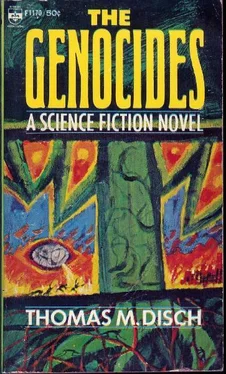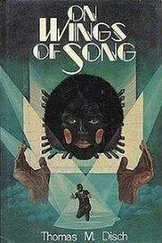“Jimmie!” the old man screamed, enraged, and he buried his hands in the smaller pile of still-smoking ashes.
Buddy turned his eyes away, for too great sorrow is like drunkenness: it was not fitting that he should see his father then.
There’s not even any meat left , he thought, looking at the other carcasses. Nothing but ashes .
“My son!” the old man cried. “My son!” He held in his finger a piece of metal that had once been the buckle of a belt. Its edges had been melted by the heat, and the metal’s retained heat was burning the old man’s fingers. He did not notice. Out of his throat came a noise, deeper than a groan, and his hands dug into the ashes once more. He buried his face in them and wept.
After a while, the men of the village arrived. One had brought a shovel to use as a prod. They buried the boy’s ashes there, for already the wind was beginning to spread them over the ground. Anderson kept the buckle.
While Anderson was speaking the words over his son’s shallow grave, they heard the moo of the last cow, Gracie. So as soon as they’d said amen , they went running after the surviving cow. Except Anderson, who walked home alone.
Gracie led them a merry old chase.
They had to abandon Tassel, the old Tassel that they still thought of as their proper home, the spring before last. The Plants had flung out their seedlings (though exactly how this was done remained a mystery, for the Plants exhibited not the slightest sign of flowers or fruiting bodies) over the surrounding fields with a profligacy that had finally conquered every human effort. They, the humans, had been extended too far: their town and the farms about it had not been laid out with a siege in view.
For the first three years, they had held their own well enough—or so it had seemed—by spraying the seedlings with poisons that the Government had developed. Each year, for as long as the Government and its laboratories lasted, it was a new poison, for the Plant developed immunities almost as quickly as the poisons were invented. But even then they had sprayed only the fields. In marshes and along the wild lake shore, in forests and along the roads, the seedlings shot up beyond the reach of any enemy but the axe—and there were just too many Plants and too few axes to make that a conceivable enterprise. Wherever the Plants grew, there was not light enough, nor water enough, nor even soil enough for anything else. When the old trees and bushes and grasses were crowded out and died, erosion stripped the land.
Not the farmlands, of course—not yet. But in only three years the Plants were crowding the fields and pastures, and then it was only a matter of time. Of very little time, really: the Plants nibbled, they bit, and, during the summer of their fifth year, they simply overran.
All that was left was this shadowy ruin. Buddy took a certain elegiac pleasure in coming here. There was even a practical side to it: scavenging in the debris he was often able to find old tools and sheet metal, even occasional books. The time for edibles was past, though. The rats and marauders working their way up from Duluth had long ago cleaned out the little that had been left behind after the move to New Tassel. So he gave up looking and went to sit on the steps of the Congregationalist Church, which thanks to his father’s continued efforts was one of the last buildings in the town to remain intact.
There had been, he remembered, an oak, a tall archetypal oak, over to the right of the Plant that had broken through the sidewalk at the edge of what used to be the town park. During the fourth winter, they had used the oak as firewood. And many elms, too. There had certainly been no lack of elms.
He heard, distantly, Gracie’s lugubrious plaint as she was pulled back to town at the end of a rope. The chase had been too much for Buddy. His legs had given out. He wondered if the Hereford was now extinct. Perhaps not, for Gracie was pregnant, she was still young, and if she bore a bull calf, there would be hope for her race, though it were but a glimmer. What more could one ask than a glimmer?
He wondered, too, how many enclaves had held out as long as Tassel. For the last two years, captured marauders had been the village’s only link with the outside, but the marauders had been growing fewer. It was likely that the cities had come to their end at last.
He was thankful he had not been there to witness it, for even the little corpse of Tassel could make him melancholic. He would not have thought he could have cared so. Before the advent of the Plants, Tassel had been the objectification of everything he despised: smallness, meanness, willful ignorance and a moral code as contemporary as Leviticus. And now he mourned it as though it had been Carthage fallen to the Romans and sown with salt, or Babylon, that great city.
It was not perhaps the corpse of the town that he mourned, but all the other corpses of which it was compounded. Once a thousand and some people had lived here, and all but a paltry two hundred and forty-seven of them were dead. How invariably the worst had survived and the best had died.
Pastern, the Congregationalist minister, and his wife Lorraine. They had been good to Buddy during the years before he’d left for the University, when life had been one long feud with his father who had wanted him to go to the Ag School in Duluth. And Vivian Sokulsky, his fourth-grade teacher. The only older woman in town with a sense of humor or a grain of intelligence. And all the others too, always the best of them.
Now, Jimmie Lee. Rationally you couldn’t blame the Plants for Jimmie’s death. He had been murdered—though how or by whom, Buddy could not imagine. Or why. Above all, why? Yet death and the Plants were such close kin that one could not feel the breath of one without seeming to see the shadow of the other.
“Hello there, stranger.” The voice had a strong musical timbre, like the speaking voice of the contralto in an operetta, but to judge by Buddy’s reaction one would have thought it harsh.
“Hello, Greta. Go away.”
The voice laughed, a full, husky laugh that would have reached the last rows of any balcony, and Greta herself came forward, as full and husky in the flesh as in her laughter, which now abruptly ceased. She stood herself before Buddy as though she were presenting a grievance before the court. Exhibit A: Greta Anderson, arms akimbo and shoulders thrown back, full hips jutting forward, her bare feet planted in the dirt like roots. She deserved better clothing than the cotton chemise she wore. In richer fabrics and brighter colors and given better support, the type of beauty Greta represented could excel any other; now she seemed just slightly overripe.
“I hardly ever see you any more. You know we’re practically next-door neighbors—”
“Except that we don’t have doors.”
“—yet I don’t see you from one week to the next. Sometimes I think you try to avoid me.”
“Sometimes I do, but you can see for yourself it doesn’t work. Now, why don’t you go fix your husband’s dinner like a good wife? It’s been a bad day all around.”
“Neil’s in a blue funk. I expect he’ll be whipped tonight, and I’m not going to be around the house—or should I say the tent?—when he comes home from that. When he went back to town, he fooled with the rope on Studs’s pen to try and make it look like it wasn’t his fault—that Studs had jumped over the bar. I can just see Studs clearing an eightfoot fence. But it didn’t do him any good. Clay and half a dozen others saw him doing it. He’ll just get whipped a little harder now.”
“That idiot!”
Greta laughed. “You said it, not me.”
Читать дальше












